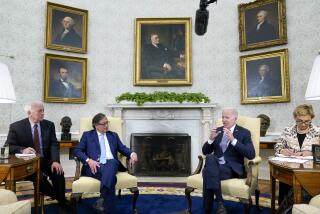Bush to Aid Colombia on Coffee Accord
- Share via
WASHINGTON — President Bush, seeking to shore up Colombia for a prolonged offensive against its cocaine cartels, promised Thursday that the United States will take the lead in repairing an international coffee agreement considered critical to the Colombian economy.
The pledge to visiting Colombian President Virgilio Barco Vargas was a clear sign of the White House’s determination to bolster Barco and his government in the face of burgeoning opposition within the South American nation to the anti-drug effort.
Only last week, the White House rejected a plea from Bogota for a one-year reinstatement of the coffee quota system. Collapse of the coffee accord in July sent prices plummeting on world markets and dealt a severe blow to Colombian coffee growers.
Needs Support
A senior Administration official said the decision to repair the deal is based on the belief that Colombia needs further support to maintain its offensive against the traffickers.
The U.S. offer appeared to resolve the primary concern voiced by Barco during the White House meeting. Although expressing gratitude for $65 million in U.S. military assistance, Barco warned that the free fall in coffee prices could cost Colombia $400 million in earnings and drive financially depressed growers into the hands of wealthy drug traffickers.
“We’re going to do what we can with the coffee agreement,” a senior Administration official said in outlining the U.S. position. “. . . We’re going to see if we can patch it back together again.”
At the same time, Bush told Barco that the Administration will mount an urgent effort to identify more ways to bolster the Colombian economy. In particular, he mentioned possible tariff reductions on Colombian exports, White House spokesman Marlin Fitzwater said.
The overture on coffee quotas puts the United States in the unusual position of pledging to rebuild one of the few remaining cartels in the international economy. Resurrection of the quotas could lead to a sharp increase in the price of coffee in American supermarkets.
“It’s something that Americans by their very nature are opposed to,” one U.S. official acknowledged. He indicated, however, that the Administration is willing to sacrifice its free-market principles--and cheap coffee--for the possibility of a prolonged disruption in the international cocaine market.
The White House session marked Barco’s first visit to the United States since he unleashed emergency powers last month to launch an all-out crackdown on Colombia’s cocaine cartels--an action that earned him hero stature in the eyes of the Administration.
In briefing reporters on the session, officials stressed that there is no indication that Barco’s determination is fading, even as the cartels mount a relentless wave of terrorist attacks in the name of “all-out war” against the government.
“He’s still full of enthusiasm and aggressive,” a senior Administration official said.
But the officials said the 90-minute meeting, held in Bush’s residential quarters, was an important show of support to make clear to Barco that U.S. backing for the anti-drug effort will not be limited to the helicopters and aircraft already provided.
In agreeing to help prop up coffee prices, the Administration is tackling what many Colombians have said is that country’s most significant economic problem.
Prices paid to growers in Colombia--the world’s third largest coffee producer--have fallen by nearly half since the International Coffee Agreement collapsed over a price dispute in July.
Economic Disruption Feared
A continued free fall in prices could make it even more difficult to persuade farmers to grow coffee instead of the more valuable coca used to produce cocaine. At the same time, it could lead to an economic disruption that could undermine the resolve of others to continue the costly anti-drug crackdown, officials in Colombia have warned.
Although expressing determination to lead the effort to repair the 74-nation coffee accord, U.S. officials cautioned that the American effort could falter unless Brazil and other major suppliers prove willing to abide by new restrictions on coffee production.
In addition to Bush and Barco, participants in the White House meeting included William J. Bennett, director of the White House Office of National Drug Control Policy; National Security Adviser Brent Scowcroft, Atty. Gen. Dick Thornburgh and White House Chief of Staff John H. Sununu.
Times staff writer Doyle McManus contributed to this article.
More to Read
Sign up for Essential California
The most important California stories and recommendations in your inbox every morning.
You may occasionally receive promotional content from the Los Angeles Times.













